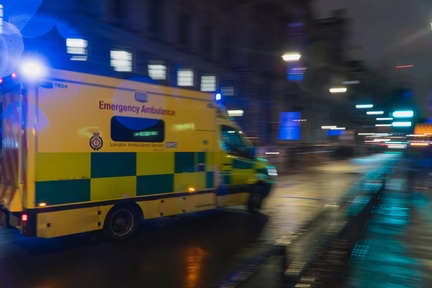Coronavirus: 'Stiff upper lip' sees more people dying at home instead of dialling 999
More people are dying at home of stroke rather than dialling 999 during the pandemic, because of a 'stiff upper lip' mentality by over 65s, a charity reveals.

A poll conducted for the Stroke Association has discovered more than a third (35 per cent) of over 65s said they are least likely to call the emergency services during the pandemic for non-COVID symptoms like signs of stroke.
Fifty-one per cent said they would not call 999 because they didn’t want to “burden already busy emergency services”, despite this age group being at the greatest risk of stroke.
The findings are the result of a poll of 1,000 people conducted between 1 – 31 May by Eden Stanley.
Stroke deaths double as 'stoicism kills'
Stroke deaths registered at home have been 54 per cent higher than the five-year average during the coronavirus pandemic, according to Office for National Statistics figures. More than double as many stroke deaths happened in the week ending 3 April, when compared to the five-year average.
Juliet Bouverie, chief executive, Stroke Association said: “It is heart-breaking to see that in one week, more than double the usual stroke deaths were recorded in people’s homes. “Whether through concerns about being a burden on the NHS, or fear of contracting coronavirus – many report delaying seeking emergency help.
“Stoicism kills and the British sense of ‘keep calm and carry on’ doesn’t save lives. It’s really worrying to see that the people most at risk of stroke are most likely to die at home because they were too frightened of bothering the emergency services.”
Why Debra delayed
Debra Purdy, aged 58, had previously had a stroke but delayed calling 999 when she started feeling pins and needles in her arm.
She said she delayed calling for help for a week because she felt being at hospital would put her at “greater risk” of catching COVID-19. She and her daughter had underlying health conditions and had been shielding at home since February to protect herself from contracting COVID-19.
When she finally went into hospital, doctors discovered she had indeed had another stroke. At the time, Mrs Purdy was being treated in hospital, she could not walk or talk and she now urges others "not to delay".
Emergency admissions down
Hospital emergency department attendance in England is down 38 per cent from what is expected at this time of year (week ending 21 June) , according to Public Health England.
Professor Martin James, consultant stroke physician at the Royal Devon & Exeter Hospital, Exeter, said: “On my acute stroke unit in Exeter and across the country stroke specialists have seen striking reductions in the number of people coming into hospital with the symptoms of stroke during the coronavirus pandemic”.
Ms Bouverie, chief executive at the charity added: “Stroke is a brain attack. When you see the signs of stroke, you need to raise the alarm right away by calling 999.”
Signs of stroke (FAST test)
• Face – Can the person smile? Has their face fallen on one side?
• Arms – Can the person raise both arms and keep them there?
• Speech problems – Can the person speak clearly and understand what you say? Is their speech slurred?
• Time – If you see any single one of these signs, it’s time to call 999
Latest News
 29-Jul-24
Dementia Bus gives carehome.co.uk staff insight into life with dementia
29-Jul-24
Dementia Bus gives carehome.co.uk staff insight into life with dementia
 27-Jul-23
UK's top home care agencies in 2023 revealed
27-Jul-23
UK's top home care agencies in 2023 revealed
 30-Nov-22
A quarter of older people keep their falls secret from family
30-Nov-22
A quarter of older people keep their falls secret from family
 29-Nov-22
'Covid-19 has not gone away' say terminally ill
29-Nov-22
'Covid-19 has not gone away' say terminally ill
 28-Nov-22
IT consultant who received poor care opens 'compassionate' home care business
28-Nov-22
IT consultant who received poor care opens 'compassionate' home care business